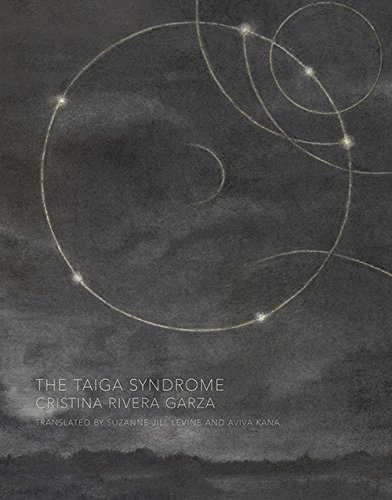THE TAIGA SYNDROME BY CRISTINA RIVERA GARZA, TRANSLATED BY SUZANNE JILL LEVINE AND AVIVA KANA
A prowling wolf cub. A feral adolescent, staring in from the boreal forest. Tiny, doll-like creatures performing in the back of a strip club. These, among others, are the inhabitants of Cristina Rivera Garza’s The Taiga Syndrome, a peculiar mystery that draws from both Hansel and Gretel and Little Red Riding Hood even as it refuses to fall into fable. Here, instead of a crimson-cloaked girl, is a grown woman, a modern detective who accepts a case that will take her into the titular Taiga in search of a recently-departed woman, whose subsequent letters lead her former husband to believe she secretly wants to be pursued.
The resultant investigation is both bright light and shadow, a slow tightrope walk towards the cold, coniferous Taiga and its cache of strange secrets. Rivera Garza maintains resistance to the traditional fable. Routinely her detective-narrator breaks the spell of her story, reminding us of the act of her telling, through commentary on her word choice (“‘Breathlessly,’” she notes, “is an adverb with rhythm”) and the presence of a literal translator accompanying her through the forest. In their breadth and variety, Rivera Garza’s words—wonderfully translated by Suzanne Jill Levine and Aviva Kana— also resist fable. In the space of a single short chapter, the author moves from delicate and beautiful (“The booming of the sky made me tremble. The wing beats of birds with no names, that couldn’t have names. The violently clashing branches”) to strictly anatomical language (“The masculine hand on the lower edge of her jaw. Below, the submandibular glands, the submental ganglia. Underneath, the veins and facial arteries and stylohyoid muscles. . .” ) proving hers is a book of raw nerves, exposed skin, but also hardness: sinew and bone. For the detective-narrator—and, indeed for us readers—Rivera Garza’s pages are these things and more. What she has created here is a diary of longing, anxiety, trauma; a record of the tension between our deepest, most personal forests and the ways that we choose to preserve them.
Dorothy, A Publishing Project.
—Review by Elizabeth DeMeo


